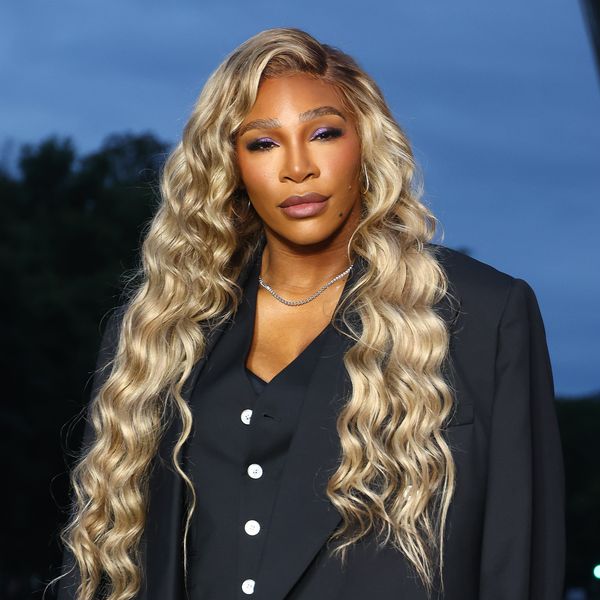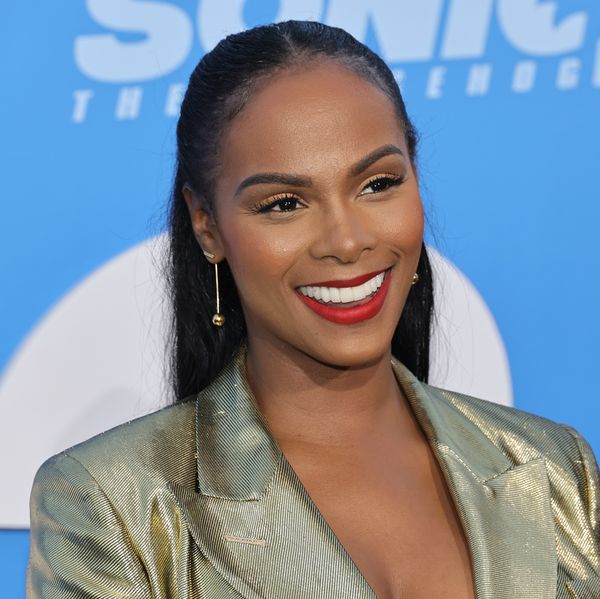
Tessa Thompson co-stars in the new Netflix movie Passing alongside actress Ruth Negga. According to the synopsis, Passing is set in 1920s New York City where a Black woman finds her world upended when her life becomes intertwined with a former childhood friend who's passing as white.
Filmed in black and white, Tessa plays Irene, a wife, and mother who lives with her family in Harlem and while she acknowledges her Blackness, her light complexion allows her to fit in white areas. Ruth Negga plays Clare who is married to a white man and is passing as a white woman.
On the surface, the film is about two Black women dealing with the effects of passing for white, however, there's a more underlining story. Tessa spoke with Newsweek about the significant film and how it's about more than just race.
Tessa's character seemed to have a perfect life---married to a doctor with two kids and living in a beautiful brownstone, however, she's not happy. Then she runs into Ruth's character and Ruth's character quickly fits into her life with her family and friends making Tessa's character feel obsolete. Tessa touched on her character not being satisfied with her life.
"I think two things are happening: Brian, her husband, is lying in bed with her and implies that he's not entirely satisfied, which is something that she knows is true but doesn't want to be honest about," she said.
"I think she herself is deeply unsatisfied. That territory felt like something I understood. I think we exist, no matter the time to a certain extent, inside of systems that leave us dissatisfied, that don't allow us to be the full, most authentic versions of ourselves. We're told lies about how we should feel being a woman and what we should be. So I think dissatisfaction is something actually that we can understand and something that doesn't get lensed an awful lot."
Despite being unsatisfied, Tessa's character tries to hold everything together, but Ruth's character's abrupt arrival exposes the pitfalls in her marriage and it seems that she can no longer "pass" like everything is OK.
Neither can Ruth's character as she continues to intrude on Tessa's character's life and realizes she misses her Blackness. But their character's internal conflicts aren't just unique to that time period. Tessa believes many people are still "passing" in today's society.
"I think it's so deeply relevant. There's such modernity to it," said Tessa. "In terms of code-switching or passing, one of the things Irene says both in the book and in our adaptation is that we're all passing for one thing or another.
She says that to her friend, who is passing himself because he's a queer man who is married and puts on the artifice of being straight, although not very convincingly to his social community.
So I think that is saying all of us sometimes find ourselves passing. There were women who were suffocated by domesticity that have to pass, queer folks that pass, all those things were happening then in the 1920s, and I think that still happens now."
Passing was written and directed by Rebecca Hall who came up with the idea after reading the 1929 novel Nella Larsen while also coming to grips with her own family in which her grandfather, who was Black, passed for white for most of his life.
Featured image by Arturo Holmes/Getty Images
We have less than 40 days left in 2024, and while I'm not one to rush goals just because it's the end of the year, it can be fun to challenge yourself to think about ways you'll close out this year big.
Whether you're planning to meet a certain financial or fitness goal, or you're simply trying to maintain and build on the progress you made this year, having something to look forward to is always a good look. Setting actual goals, according to research, actually leads to more success than just playing things by ear. So here are a few to get you started, sis:
(Disclaimer: Not everything is for everyone, so do like my Granny always says: "Eat the meat. Spit out the bone." Take on five out of the 40 and focus on that for the remainder of the year, or do them all. Either way, this is just to get you started.)
40 Ways To End The Year Strong and Inspired
Money Moves

Riska/Getty Images
1. Increase your retirement (or other savings/investment) contributions by 1%.
Experts have found that you could be leaving money on the table by not upping your contributions when you can.
2. Cancel two to five subscriptions.
You could be missing hundreds, even thousands, of dollars a year due to sneaky price hikes and "updates."
3. Create a "fun" in a high-yield savings account.
This is especially important if you struggle with the dreaded b-word (budget) and will make next year's efforts a lot less intimidating. Even if it's $10 a month, do it.
4. Put on your big-girl panties, and set up automatic transfers and payments for at least one bill.
It reduces the stress of managing bills, lessens the chance of a missed payment---and the fees that come with that---and there can be cost savings for doing so.
5. Invest in a cleaner or housekeeping service.
Bosses who value their time (and mental health) invest their dollars into areas where the time they'd spend doing those tasks themselves could be better used to focus on other money-making projects. (And yes, rest is part of that.) Get a housekeeper, sis, or drop off that laundry, even if it's once per month.
6. Donate to a charity.
Beyond the tax benefits, it's a win-win for the greater good of communities you care about.
7. Review your insurance policies and negotiate a better rate (or move on) before their end dates.
Experts often agree this is a small but mighty step to take each year, especially since insurance rates are competitive, you could be spending more money than you need to (or not enough) and your insurance rates can affect your mortgage payments.
8. Call your loan provider and refinance.
As interest rates fall, “millions of borrowers may be able to refinance and get more affordable payments. As interest rates eased down to 6.5%, about 2.5 million borrowers could already refinance and save at least 75 basis points (0.75%) on their interest rate,” the Consumer Financial Protection Bureau reports. You can also refinance student and other types of loans.
9. Stop buying individual items and stock up via going bulk.
Research has found that, among 30 common products, buying in bulk could save you 27% compared with buying in lower quantities. Water, paper products, and baby products like diapers, toiletries, and garbage bags are the top items where people see the most cost-effectiveness. (This has been a lifesaver for me—children, large family, or not—especially when it comes to toothpaste, deodorant, toilet paper, and feminine hygiene products, saving stress, time, and money.)
10. Go cash-only for the holidays.
If you set smart goals and stick to limits on things like gifts, going out to eat, or groceries, you'll see the benefits of this. Cash-stuffing is one method recommended, but something as simple as taking a $10 bill out for lunch, disabling that card for an hour, and leaving your card in a safe place at the office can give you that mindset jump start to see how far you can take your money without the need to splurge.
Love And Romance
11. Say "no."
There are clear mental and physical health benefits to saying no including the setting of healthy boundaries, creating time and energy for other self-care activities, and protecting yourself from physically harmful situations (i.e. unprotected sex or abuse). Just say it, clearly and simply, when you need to.
12. Set a fun, free, adults-only date night for once a week or twice a month with your spouse.
If busy, high-profile folk have touted the success of this, even you can make the time for quality time with your partner. And it's even better when it costs nothing. The best connections are made doing something chill, challenging, or outside the usual dinner-and-a-movie date. Play a game that allows you to reconnect, take a walk in your neighborhood to chat and laugh, or try a little erotic chocolate/edible liquid/paint episode a la Mea Culpa.
13. Go out with Mr. or Ms. "Not My Type."
I love my man, but if I were waiting out for my "type" at the time, we wouldn't be celebrating seven (going on eight) years together. Sometimes having strict, unrealistic expectations for a spouse (especially related to things like height, physical features, or career path) is what's keeping you alone and lonely.
Take the pressure off and explore all your options. I'm not telling you to stop popping the balloon on the guy who earns $20,000 less than you if that's a hard no that Jesus himself told you to skip. I'm asking you to explore other options and see what else God might have out there for your love journey.
14. Immediately apologize and pray together.
I've learned that always being "right" isn't always ideal when you truly care about someone and you're in a relationship for the long haul. Defaulting to an apology when necessary, even when things aren't 100% resolved, is a good way to prioritize peace and save your energy for more worthwhile battles. Research has even supported the benefits of apologies in relationships, and how couples married for five or more years do it often.
15. Get a Rose and discover true self-love.
Do I really have to explain this? You've gotta know what satisfies you, and how better to figure that out than to practice self-love in the bed by yourself? You can also try this with a partner, but as a woman who got on this train very much later in my sexual activity journey. I have a lot more learning to do on my own, and even in a satisfying relationship, I like to find out new things about myself, by myself.
Figure out what you're into, watch what you want to watch, and read what you want to read to define pleasure for yourself. There's a freedom and empowering element there especially if you're used to prioritizing pleasing your partner.
16. Be direct and have the "money talk" with bae.
Money issues are one of the leading causes of divorce, so you need to have those conversations before you even think about marrying someone. And true, nobody can predict the future so you won't be able to avoid some challenges altogether, however, talking with your potential spouse about how they view money, their spending habits, and the pain points in terms of their approach to money management can at least give you a glimpse into what's in store if you do walk down the aisle, move in with them, or decide to share a bank account/business/child with them.
17. Invest in the "paid" version of that dating app.
I know plenty of successful, married folk who did this and met "the one" as a result. Let's be honest: The free version is for playing around. I had a lot of fun with my "free" profile back in the day, trust me. Upgrade that photo, profile, and package, and see if the quality of your dating adventures changes when you're serious about finding a true partner. Dating coaches and matchmakers cosign this.
18. Solo travel to meet that long-distance connection.
Sometimes, your perfect match isn't within 100 miles of you, and that's okay. Make it an adventure, enjoy the memories, and book that ticket. I met my man this way and it's been a whirlwind escape ever since. If you're not comfortable traveling solo, travel or (network to plan travel) with a group via Facebook.
Career And Business

Riska/Getty Images
19. Schedule coffee or virtual meetups with smart people from your graduating class, previous employer, or current employer.
I have gotten many freelance opportunities by doing this. It's as simple as connecting and offering value (or simply learning how you can better equip yourself to do so.) It's also a great way to expand your network, spark new friendships, or find out about new job opportunities.
20. Invest in a well-made suit.
I don't care what industry you're in, a suit says "power," and it's not as old-school or out-of-style as you'd think. Plus the whole experience of looking for a new one (or getting one tailored) is fun and affirming. Try these options. I swear, anytime I wear a blazer, I'm treated like a celebrity or boss, especially when traveling. I was once upgraded to first-class wearing a yellow blazer outfit, and the airline professional literally said, "You look like somebody important. Here you go."
21. Volunteer for a worthwhile project or cause that's important to your company.
If you're overworked and underappreciated, skip this one, but if you truly have the time, love what you do, and want to advance, this move is clutch. Volunteering for extra projects got me where I am today in media because I had foresight, and knew that was the only way at the time to leverage relationships, and I was able to challenge myself to learn skills that 20 years later are still bankable. That VP you can't get a meeting with will be at that gala your company is planning, so join that committee, sis.
22. Write down why you deserve a raise and ask for it in your next one-on-one.
Gather those receipts (ie sales increase numbers, KPIs met, deals closed, people acquired via recruitment, the impact of systems updates, or other tangible success metrics) and ask for that raise before the first or second-quarter budgets are being finalized.
23. Instead of quitting, write down your exit plan.
While revenge quitting is set to be a thing next year (and maybe you're among those who will be leading the trend), try the better boss move and quit with a real plan.
24. Start automatically separating that estimated self-employed quarterly tax estimate.
If you have side hustles (or you're collecting 1099 income,) baby, you do not want to neglect those quarter tax payments. Talk to a professional, do your research, and set up automatic transfers to an account specifically for paying these at the appropriate due dates.
25. Sign up for a free one- to 11-week course related to your industry—or the industry you want to be in next year.
Institutions like Harvard University and platforms like Coursera offer free courses that can enhance your skills. You can also invest in certificate courses with accredited colleges as well as tech training.
26. Hit "Easy Apply" for 10 dream jobs listed on LinkedIn.
While you shouldn't solely rely on this when actively job-seeking, using this convenient LinkedIn option is a great way to get into the habit of applying for positions. And if you're already employed, you should still be "dating" other employers if you're looking to make a move in the next six months. Keep your interview skills sharp, practice toughening up for the "nos," and get a bit of an ego boost in the process.
Self-Care And Wellness
27. Pre-schedule three month's worth of massages.
Oftentimes this is cost-effective since some spas offer deals for multiple bookings. Also, it makes an act of self-care deliberate and important, not an option. When you get that reminder call, you'll know it's real.
28. Fire that therapist and try another one.
Cultural competency in mental health support is one major problem that can hinder Black women from even bothering with therapy. And who wants the added stress of spending multiple, paid sessions explaining why something is a microaggression? Cut the cord and move on to try someone else, either via a Black women therapists channel or recommendations from others.
29. Join a small group at church.
Bedside service ain't gonna cut it and neither is going to the usual Sunday service. Join a smaller group and upgrade your efforts to connect, network, and elevate spiritually. Even if virtually, take a step to dig a bit deeper with more targeted Bible study and discussions.
30. Say no, even to loved ones.
This is on here twice, for a reason. Saying no is the simplest, most powerful micro-action you can take today to make 2025 better. No explanations. No guilt. Say no.
31. Choose one "luxury" beauty product for skincare and stick to it.
This was trending big on social, especially for millennials hitting their 40s. There's just something so freeing about not giving in to every trend and sticking to the basics that work, especially when there are quality, healthy ingredients involved. Put those orders on auto-renew.
32. Sign up for a new sport or fitness class just for fun, not for results.
It's great to be on a weight-loss or weight-lifting journey, but try something just for the fun of it. Switch things up with a couple of these fitness activities.
33. Book a staycation.
Leave the passport at home and explore a nearby community or another town in your state. There's so much enrichment in your own backyard right here in the U.S., and you don't even have to break the bank.
34. Pre-schedule your mammograms, Pap smear, and peri-menopause checkups for next year.
Take control of your health by pre-scheduling essential appointments like mammograms, Pap smears, and peri-menopause check-ups for 2025. Prioritizing these screenings early ensures you stay on top of your wellness and make time for self-care in the new year.
35. Cut off support of beauty and wellness professionals whose customer service is below standard.
This is another one that many Black women have been vocal about—from unrealistic pre-appointment requirements, to booking fees, to long waits, to unsavory in-salon experiences. Spot the red flags early, and just stop accommodating foolishness. Support salons or experienced stylists who are kind, have proper systems in place and value your time.
36. Schedule five to 10-minute moments of silence on your calendar.
Again, wellness is not optional, and if it's not on my calendar, it's not official. Sit quietly. Pray. Meditate. Or do nothing. The benefits of silent moments are almost endless.
37. Download a meditation app.
If you've found that meditation is difficult to schedule or to even start, an app can help. Try this, this, or this one, and take that step to embrace something new to enhance your wellness routine. If you're tired of downloading apps, create a playlist for meditation via Amazon Music or Spotify and schedule a reminder to do it once a day or week.
38. Invest in a healthy meal prep or delivery service.
Time is emotionally expensive, so save as much of it as possible. Getting into meal prep to keep to your goals is a great way to save time, stress, and effort. The health benefits of meal prepping have also been proven via research.
39. Create a positive playlist on Spotify, Amazon Music, YouTube, or other streaming platform.
It can be podcasts, music, affirmations, or somatic sounds. It's a game-changer. You can even set an alarm to wake you up to start your day with the positive playlist. Not into creating your own? There are plenty to choose from with a quick search.
40. Set up reminders for Alexa (Siri or other AI) to remind you, "You are loved," and "You are okay."
This simple effort can boost your endorphins and remind you that you're indeed, not alone, and you will be okay, regardless. To set mine up, I simply commanded, "Alexa, remind me everyday 'Jesus loves me,'" and like clockwork she does. She almost scared the ish out of me one day when I'd forgotten the reminder was active, but it was the reminder I needed when anxiety had gotten the best of me that week.
Let’s make things inbox official! Sign up for the xoNecole newsletter for love, wellness, career, and exclusive content delivered straight to your inbox.
Featured image by
The List Of Golden Globes Awards Nominees Has Dropped: Who's Nominated & Who Got Snubbed
The Golden Globes started the week off with a bang announcing the 2025 nominees and per usual we are rooting for everybody Black.
The film Emilia Pérez, featuring Zoe Saldaña, leads the Golden Globe nominations with 10 nominations, while The Brutalist has seven. For television, The Bear received the most nominations with five, followed by Only Murders in the Building and Shōgunwith four each. Before we celebrate our people, we must also acknowledge the snubs.
The Golden Globes, and other award organizations, have faced criticism for overlooking Black-led films, particularly after it was revealed in 2021 that the voting body lacked Black representation.
The Hollywood Foreign Press Association, despite recent efforts to diversify, has faced criticism for overlooking acclaimed performances by Black actresses. This year, Marianne Jean-Baptiste and Danielle Deadwyler were notably absent from the nominees, despite their award-winning roles in Hard Truths and The Piano Lesson, respectively. Danielle's omission marks the second time she has been snubbed by the Globes for a critically acclaimed performance.
Give our girl her things — she more than deserves them!
- YouTubewww.youtube.com
According to the Golden Globes, “In 2023, UCLA highlighted that Black actors make up 14.8% and 16.2% of all theatrical and streaming roles. However, we’ve seen many success stories that have inspired multiple generations. Black people in the entertainment industry have seen great strides in advancement in the creative arts that have helped evolve our everyday reality.”
And like my therapist always reminds me: two things can be true at once. Yes, Black thespians are represented more in the entertainment industry AND we still have lots of work to do as we fully live out the dreams of our ancestors.
The 82nd ceremony will be broadcast on January 5 on CBS and Paramount+. Find the full list of Black nominees below, including the category for which they are nominated:
Film
- Cynthia Erivo (Best Performance by a Female Actor in a Motion Picture – Musical or Comedy) for her role in Wicked
- Zendaya (Best Performance by a Female Actor in a Motion Picture – Musical or Comedy) for her role in Challengers
- Colman Domingo (Best Performance by a Male Actor in a Motion Picture – Drama) for his role in Sing Sing
- Denzel Washington (Best Performance by a Male Actor in a Supporting Role) for his role in Gladiator II
- Zoe Saldaña (Best Supporting Actress in a Motion Picture) for her role in Emilia Pérez
- Kris Bowers (Best Original Score) for the film The Wild Robot
Television
- Donald Glover (Best Performance by a Male Actor in a Television Series) for his role inMr. and Mrs. Smith
- Quinta Brunson (Best Performance by a Female Actor in a Television Series – Musical or Comedy) for her role in Abbott Elementary
- Ayo Edebiri (Best Performance by a Female Actor in a Television Series – Musical or Comedy) for her role in The Bear
- Jamie Foxx (Best Performance in Stand-Up Comedy on Television) for Jamie Foxx: What Had Happened Was
Let’s make things inbox official! Sign up for the xoNecole newsletter for love, wellness, career, and exclusive content delivered straight to your inbox.
Featured image by Emma McIntyre/Getty Images for Academy Museum of Motion Pictures









